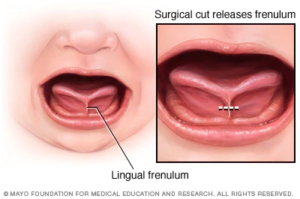Parenthood is a beautiful journey that is filled with things like baby’s first haircut and baby’s first tooth. As our infants turn into toddlers and teeth begin erupting, speech begins to develop from MaMa and DaDa to simple sentences by age 2. According to parents.com, by age 4 children can speak clearly in more complex sentences.
But what if your child is the 5% that is experiencing an issue forming sounds like ‘sss’ or ‘shhh’ often referred to as a lisp?
Many times, it’s considered cute and most parents think the child will outgrow this once they receive their adult teeth. Unfortunately, most parents don’t realize that this is actually a speech impediment that may require future work with a speech therapist and can influence the development of dental issues like an open-bite or cross-bite.
So what causes a lisp?
There can be functional causes not related to the anatomy of the mouth and tongue, such as erroneous placement of the tongue when forming sounds. However, there can also be a physical reason known as ankyloglossia or commonly know as tongue-tied. The thick or tight band of tissue (the lingual frenum) attaches the bottom of the tongue’s tip to the floor of the mouth.
The Cleveland Clinic lists symptoms of tongue-tie as:
Infants
- Difficulty breastfeeding
- Breast feeding for extended periods of time
- Constant hunger
- Trouble gaining weight
- A clinching sound while the child is feeding
Young Children
- Difficulty licking ice cream
- Difficulty playing a wind instrument
- Problems sticking the tongue out
- Speech impediments
Will my child grown out of being ‘Tongue-Tied’?

This anatomical anomaly does not go away as the child matures into adulthood. Often times, the effects of having the tongue restricted to being directly behind the teeth will result in an open-bite or other misalignment of the teeth. Problems with swallowing
A Pediatrician, Dentist, or Orthodontist can help you determine if a simple in office procedure called a frenotomy is right for yourself or your child.
Dr. Escott specializes in complex orthodontic cases and works closely with dentists to help patients correct the effects of being tongue tied with a combination of braces (orthodontics) and possible frenotomy.
The first step is to schedule a consultation for a complete evaluation: Online: Appointment request or call us! 352-383-6166



